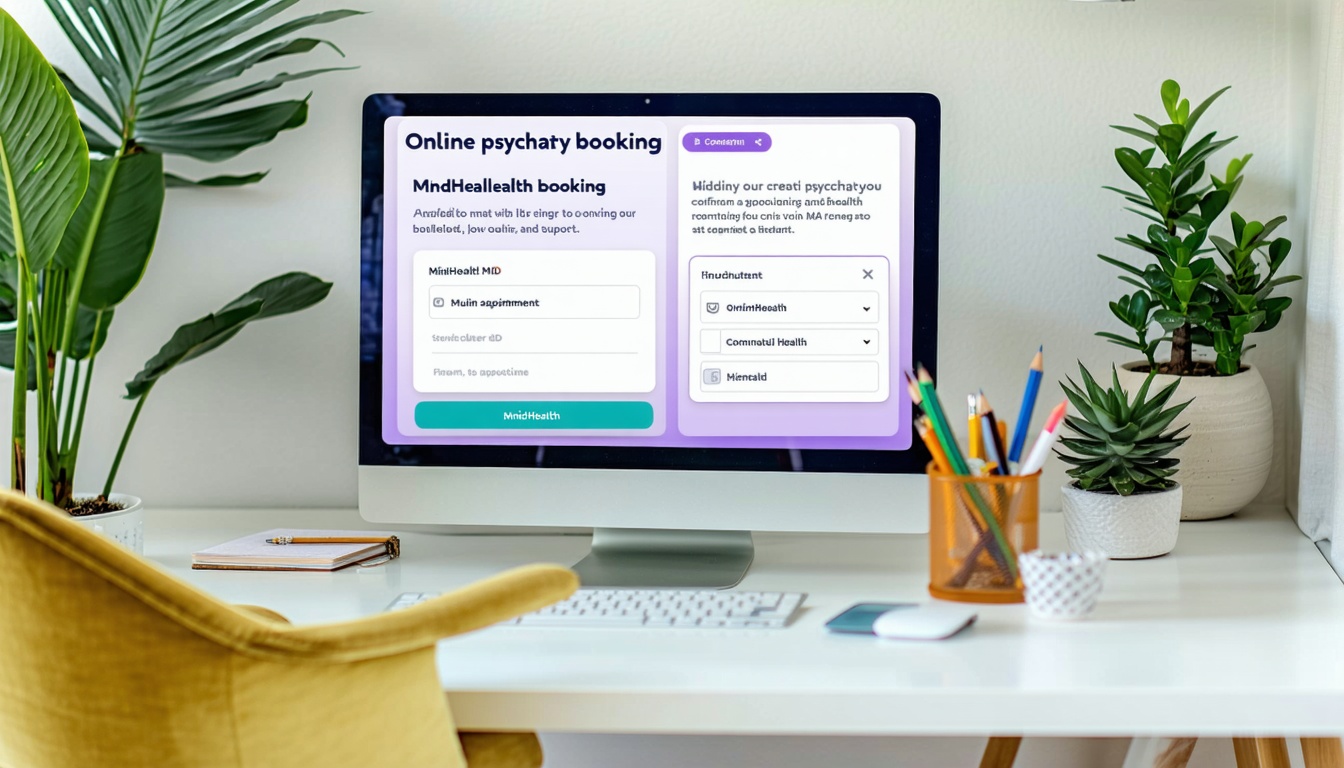If you’ve been searching for the best way to get personalized, effective mental health care, you’ve probably come across the concept of EEG for treatment planning. EEG (electroencephalogram) scans measure the electrical activity in your brain, offering a window into how different regions communicate. Think of it like a real-time map of your brain’s inner workings. From guiding medication decisions to creating more accurate therapy plans, EEG-based insights can help you get the precise care you need. And when combined with telehealth psychiatry, medication-assisted treatment (MAT), and TMS (transcranial magnetic stimulation), these insights can streamline your journey toward better mental health.
But why is EEG such a game-changer, especially when you want help for conditions like depression, anxiety, or substance use disorders? During EEG testing, sensors record specific brain wave patterns (like alpha, beta, or delta waves) that indicate how various neural circuits fire. By identifying abnormalities, specialists can tailor treatments in a more data-driven, targeted way. Whether you’re exploring telehealth options or considering TMS sessions, EEG results can personalize your plan and potentially improve outcomes. At MindHealth MD, we use this evidence-based approach to support you or your loved one every step of the way.
Recognize how EEG works
Definition and basic principles
EEG is a non-invasive test where small electrodes attach to your scalp to pick up neuron activity. These signals appear as wave patterns on a computer, telling clinicians which parts of your brain might be underactive or overactive. According to Stanford Health Care [1], EEG has long been used to monitor and diagnose seizures, strokes, and other neurological conditions. Today, specialists also use EEG results to map out brain function for psychiatric conditions such as depression or anxiety. This test is safe, painless, and can be done in both outpatient and clinical settings.
Because EEG measures your brain’s electrical signals in real time, it detects even slight irregularities. Let’s say you’re experiencing persistent depressive symptoms or racing thoughts. An EEG might highlight unusual brain wave patterns, guiding your clinician to the right therapy or medication. Treatments at MindHealth MD thrive on understanding these nuances so you can feel better, faster.
Key brain wave categories
When you look at a typical EEG chart, you’ll see wavy lines that correspond to delta, theta, alpha, beta, and gamma waves. The frequency of these waves (measured in hertz) indicates different levels of brain activity:
- Delta waves (0.5-4 Hz) often appear in deep sleep.
- Theta waves (4-8 Hz) commonly occur in daydreaming or drowsiness.
- Alpha waves (8-12 Hz) reflect a relaxed, mindful state.
- Beta waves (12-35 Hz) represent an alert, focused mindset.
- Gamma waves (≥32 Hz) can reveal high-level cognitive processing.
By comparing which waves dominate (or lag behind) in certain parts of your brain, specialists can pinpoint unique vulnerabilities or imbalances. These findings may lead them to recommend, for example, a specific TMS frequency to stimulate brain regions in a personalized way. The result? A more effective healing strategy that goes beyond guesswork.
Leverage EEG for treatment planning
Personalizing TMS protocols
TMS (transcranial magnetic stimulation) delivers magnetic pulses to specific areas of your brain that influence mood and behavior. Because every person’s brain is wired a bit differently, “one-size-fits-all” TMS isn’t always optimal. EEG for treatment planning helps clinicians figure out where and at what frequency your brain might respond best to stimulation. According to Brain Therapy TMS [2], combining EEG imaging with TMS can boost success rates—particularly when paired with talk therapy. In other words, the right energy level and the right spot can jumpstart brain regions linked to improvement in depression and anxiety.
If you’re curious about TMS and want a more tailored plan, you can schedule Tms treatment at MindHealth MD. Our providers interpret EEG data to customize TMS sessions so you spend less time wondering if it’ll work and more time reaping the benefits. This data-driven approach also helps refine treatment if your symptoms change over time—because your mental health journey is dynamic, not static.
Enhancing MAT outcomes
Medication-assisted treatment (MAT) can be life-changing for individuals coping with substance use disorders. Combining medications with therapy, MAT addresses cravings and withdrawal symptoms to help you focus on recovery. But just like TMS, MAT is not automatically the same for everyone. An EEG brain mapping test [3] can reveal patterns linked to your mood or cognitive function that might influence how you respond to medications.
At MindHealth MD, we use EEG insights to optimize the timing and dosage of MAT, whether you’re seeking mat for opioid addiction or mat for alcohol dependency. By continuously monitoring your progress, our clinicians can refine your medication plan, select psychotherapy techniques that resonate with you, and address co-occurring mental health challenges. Basically, we aim to make your MAT process a smoother ride—guided by real data from your own brain.
Combine EEG with telehealth psychiatry
Why real-time data matters
While telehealth psychiatry has gained popularity for its convenience, it’s even more effective when combined with EEG-based insights. Imagine having a virtual session from the comfort of your home, yet still receiving targeted recommendations that fit your unique brain-activity profile. EEG data can help your provider gauge whether your treatment is on track, or if adjustments to therapy or medication could be beneficial.
Thanks to advanced technology, you might complete an EEG exam at a nearby partner facility or clinic, then share the results digitally with your MindHealth MD provider. This synergy offers real-time data that can significantly shape your care path. It’s a collaborative process—almost like you and your clinician are co-pilots, using live navigation updates to guide you to your destination faster.
Accessibility and convenience
Telehealth psychiatry removes physical barriers that might keep you from seeking help, such as limited providers in your area or difficulty traveling. You can quickly set up a telepsychiatry appointment to chat with a specialist, discuss your EEG results, and plan manageable next steps. This approach is particularly helpful if you live in a remote community or simply appreciate saving time by talking to your psychiatrist without leaving home.
MindHealth MD also offers flexible booking, letting you access everything from same day psychiatric evaluation to 48 hour psychiatry booking, so you’re never left waiting too long. And if you suspect your mental health might need urgent attention, we can help connect you with mental health urgent appointment options. At each step, EEG results inform the most appropriate therapy or medication tweaks, making sure you’re never in the dark about your own brain health.
Benefit from evidence-based approaches
Data-driven therapy
Evidence-based medicine is about combining the latest research findings with patient preference and clinical expertise. EEG for treatment planning fits right into this model. It leverages measurable data from your brain to inform decisions and reduce guesswork. Research from the National Center for Biotechnology Information [4] supports the idea that evidence-based care enhances outcomes in psychiatric disorders, especially when mental health professionals tailor treatment protocols to each individual.
Because of EEG’s accuracy, it’s particularly useful in diagnosing complex conditions like epilepsy or clarifying whether certain symptoms stem from brain wave imbalances. When you bring EEG results into your telehealth or in-person sessions, it’s like having a scientific companion guiding you toward the best therapy type—whether that’s cognitive-behavioral therapy, TMS, or a specialized new approach. You’re not just told, “Try this and see if it helps.” Instead, you get more immediate feedback from a direct measurement of your mental processes.
Psychotherapy synergy
Data-driven methods don’t replace the human element; they enhance it. Talk therapy, or psychotherapy, remains one of the most critical pillars of mental health care. Studies from Brain Therapy TMS [2] and other institutions show that combining psychotherapy with TMS can significantly increase success rates. The same logic applies to combining psychotherapy with EEG-based planning.
By examining how your brain waves shift during various emotional states, your therapist can tailor sessions more effectively. If your EEG points to heightened beta activity (often associated with stress or anxiety), your therapist may emphasize relaxation techniques or stress management strategies. Meanwhile, if alpha waves appear low (potentially linked to depression or difficulty regulating mood), sessions might prioritize self-soothing or cognitive reframing exercises. This synergy ensures you get the best of both worlds: human empathy plus high-tech analytics.
Choose MindHealth MD services
Our data-driven process
At MindHealth MD, we believe your mental wellness isn’t just about a diagnosis—it’s about understanding your unique brain and body. We rely on EEG-based insights, clinical interviews, and comprehensive histories to create plans designed just for you. Whether you need help with depression, anxiety, PTSD, or substance use, our clinicians consult your EEG results at every turning point. If you’re ready to give it a try, you can book psychiatric appointment for a thorough evaluation that may include an eeg diagnostic for mental health.
This method isn’t reserved for one condition alone. Maybe you’re exploring treatment resistant depression care after multiple therapies haven’t worked. Or you’re seeking ways to refine your existing medication regimen for better symptom control. We ensure each stage of your treatment is backed by the relevant data, so you’re confident in your path to feeling better.
Telehealth advantages
Why juggle traffic or rearrange your entire day just to see a psychiatrist? With MindHealth MD’s telehealth services, you can schedule sessions at times that suit your busy life. We offer virtual psychiatry session options for adults, as well as specialized child psychiatry immediate access if your family needs quicker help. Our team understands how essential timely care can be, especially for younger patients in crisis.
Beyond convenience, telehealth sessions let you maintain momentum. You can seamlessly hop onto a video call, discuss how your latest EEG insights fit into your current treatment, and make real-time adjustments if necessary. For example, if your EEG data suggests you’re making good progress, your clinician might recommend spacing out sessions. If new concerns arise, you can schedule additional check-ins without a lengthy wait.
Insurance and in-network coverage
Finances can be a big concern, especially if you’re exploring TMS or considering long-term therapy. Fortunately, MindHealth MD offers in network psychiatry care and insurance accepted psychiatry solutions. We believe everyone should have access to mental health services, and that includes advanced diagnostic tools like EEG. Our care coordinators can go through your coverage details and walk you through any out-of-pocket costs before you commit. If necessary, we also have self pay psychiatry session options for those without insurance.
In addition, we have established in network tms providers for individuals who plan on receiving TMS under their insurance coverage. We know that effective therapy shouldn’t break the bank, so we aim to remove as many financial barriers as possible.
Success stories and collaboration
One of our guiding principles is collaboration—both with you and among different specialists. By sharing EEG findings and progress updates across our team, we tailor your care no matter how many treatments or specialists you need. Maybe you start with a short term psychiatry session to address acute anxiety, then transition to TMS for stubborn depressive symptoms. Along the way, EEG results offer an objective measure of change, helping you and our clinicians see tangible progress.
A real-world example might involve an individual struggling with co-occurring anxiety and substance misuse. Thanks to EEG readings that illuminated both anxious brain activity and potential triggers tied to reward circuitry, our providers scheduled a blend of TMS sessions and substance use psychiatry service, adjusting along the way. With each step, you’d see your EEG profile evolve, offering encouraging proof that your brain can adapt, recover, and thrive.
Address common questions
Below are some of the most frequently asked questions about EEG-guided care at MindHealth MD, especially when combined with telehealth psychiatry, TMS, and MAT.
-
Does an EEG hurt or have side effects?
Not at all. EEG electrodes sit on your scalp and measure electrical signals passively. There’s no discomfort or pain. In fact, many people say it feels like wearing a snug hat. Afterward, there are no lingering side effects or downtime, so you can resume your day as usual. -
How often will I need an EEG?
It depends. Some patients undergo an initial EEG to help us establish baseline activity, then we repeat it at certain milestones to measure progress. Others might only need one or two follow-ups. Your psychiatrist will let you know what’s recommended based on symptoms and treatment goals. -
Is EEG only for epilepsy or seizure disorders?
Historically, EEG has been a standard tool for diagnosing and managing epilepsy. However, it’s also effective for uncovering subtler irregularities in brain activity tied to depression, anxiety, and other psychiatric conditions. Places like Stanford Health Care use EEG for a range of neurological and psychiatric applications, and we do, too. -
How accurate is an EEG for mental health issues?
While EEG isn’t a standalone magic wand for every diagnosis, it’s highly useful when combined with clinical interviews and other assessments. A single test might not tell the entire story, but repeated EEGs can reveal patterns over time. This layered approach gives us more precise insight into how your treatments are working. -
How do I arrange an EEG with MindHealth MD?
We can guide you through the process. One route is to book psychiatric appointment or online psychiatry booking for an initial consult. After discussing your symptoms and treatment history, our providers may recommend an eeg brain mapping test at a convenient location. The results will help shape your personalized treatment plan, which might include TMS, MAT, or telehealth sessions.
Plan your next steps
When it comes to mental health, clarity is everything. An EEG can illuminate aspects of your brain’s activity that might otherwise remain hidden, offering a clear path to more targeted treatments. Whether you’re battling chronic anxiety, exploring new solutions for treatment-resistant depression, or looking into co occurring disorders treatment, EEG for treatment planning gives you a voice in your own care—rooted in real data.
At MindHealth MD, we’re proud to integrate EEG results with a full suite of services that meet you where you are. We pair medication strategies with talk therapy, if that’s best for you, or combine TMS with continuous EEG monitoring to keep tabs on your brain’s response. Our telehealth platform allows for flexible, accessible sessions, and our in-network partnerships help simplify insurance questions. As experts in psychiatric medication management and advanced treatments like tms therapy for depression, we prioritize evidence-based care—even from the comfort of your home.
Wondering how to begin? You’re invited to set up a telehealth mat consultation if you’re addressing a substance use concern, or a standard adult psychiatry intake appointment if you want to evaluate your overall mental health. If your child or teenager is affected, you might consider a child psychiatry immediate access appointment. No matter what you choose, we’ll walk you through everything from insurance details to post-appointment instructions. And if you need help right away, consider our immediate psychiatry appointment to get started within hours.
Ultimately, EEG-based insights allow you to actively participate in your own healing. You’re not just passively taking medication or sitting through sessions. You’re seeing how your brain behaves, measuring improvements, and adjusting the plan to match your evolving needs. That level of personalization can deliver better results—and help you or your loved ones feel more confident along the way.
If you’ve read this far, you’re clearly invested in finding the right mental health solutions. MindHealth MD is here to make that journey straightforward, science-driven, and absolutely centered on you. By harnessing the power of EEG, we’re able to craft plans that adapt to your life, giving you a better shot at meaningful, lasting recovery. Now’s the time to take action: reach out to consult with our team, schedule a session, or explore whether EEG-based therapy might be the piece that finally completes your treatment puzzle. Let’s get you the care you deserve, powered by insight and compassion.
References
- (Stanford Health Care)
- (Brain Therapy TMS)
- (eeg brain mapping test)
- (NCBI)








